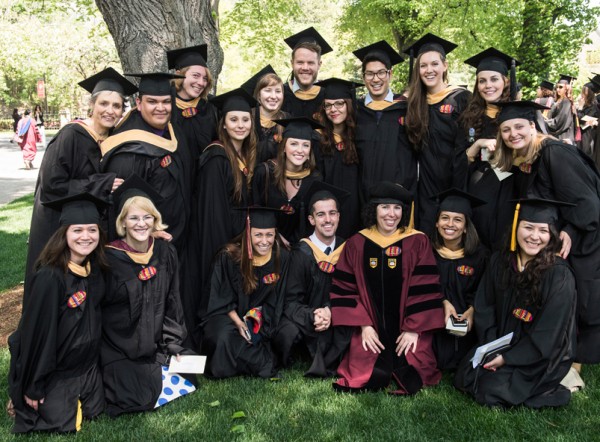
The inaugural cohort of the Latino Leadership Initiative, at Commencement 2015. Professor Calvo is in red.
Three years ago, Boston College School of Social Work Assistant Professor Rocío Calvo proposed an innovative program designed to better prepare students to work with the increasingly diverse community that is the United States, and in particular, with the largest of the nation’s minority populations, Latinos.
This May, that program, called the Latino Leadership Initiative, graduated its first cohort of students; they are 23 women and men from all walks of life who now possess strengthened linguistic and cultural competencies to more effectively serve Latino communities in their future life and work.
“It makes me smile when I think of this exceptionally brave group,” says Calvo. “Just a few years ago we had a dream, and we asked these students to join us on our journey. They have been entrepreneurs open to the challenges of establishing something new, and leaders willing to work from within communities in order to empower those they serve.”
In many ways, the year 2012 in Boston provided the right time and place to pursue the launch of the LLI. Some sources suggest that, in less than 20 years, minority populations in the U.S. will outnumber the current white majority. In Boston, in 2015, one in every four citizens is foreign-born. In both of these examples, Latinos comprise the most significant community, in terms of numbers.
It’s no secret, of course, that today’s social worker will likely work with Latinos during the course of their career. It’s also no surprise, that on average, people with Latino backgrounds are disproportionally affected by low educational attainment, fewer financial resources, and higher risk of discrimination. As a consequence, their families and communities often struggle with poverty and access to jobs and basic services.
The LLI seeks to begin to build solutions to these realities by training social workers who can become a part of these communities, as Calvo says, and “do the work from within.” This starts with language proficiency – the LLI is one of the first programs nationwide to offer MSW courses in Spanish – but it is also so much more than this. The LLI is about sharing the Latino experience, and the brave, creative, entrepreneurial spirit that encourages so many to leave their home countries to work in low paying jobs in the hopes of something better. And it is about teaching the cultural traits that serve as protective factors for so many who are forced to deal with the daily hardships of living in a new place. “Let’s train social workers to use the strengths that the community brings with them, in order to serve them better,” explains Calvo.
It’s a message that resonates with initial LLI cohort member Luis Balcazar, a Mexican-American who is originally from Chicago. “I’m very proud of my cultural heritage, and the fact that I am bilingual,” he explains. “I always knew that this is something I wanted to be able to use professionally, and the LLI has helped me to further cultivate my background as a marketable skill. But more than that, the LLI has taught me to appreciate myself as a leader in my field. There is a need for change in the system, and in particular, in how we serve Latino populations. I now know that I can be an asset to these communities as I go out into the workforce. This means a lot to me.”
Throughout the course of the program, cohort members formed tight bonds; Calvo’s expectation is that these bonds will continue to remain intact long after the students leave Chestnut Hill and pursue careers in cities and towns across the globe. In short, she hopes that the LLI becomes “a critical mass that grows, and is alive.”
Claire Madden, MSW ’15, can’t imagine the LLI any other way. “Even across cohorts, LLI members are all connected,” she says. “And the connections go way beyond age or background, or some of the other criteria that often bring people together. In the LLI, we have a bond based in the fact that we are Latinos, or allies of Latinos. We bring unique perspectives and experiences into our conversations, but in the end, we can all play a role in our shared goal to be unofficial catalysts for change in the communities in which we serve.”
Fellow graduating LLI member Rebecca Camargo was destined to do just this kind of work. Her mother, aunt, and grandmother, who immigrated from Peru and was an undocumented migrant living in the U.S. for many years, are all social workers. “I was born out of the social justice tradition,” she explains.
Moving forward, Rebecca plans to follow in her mother’s footsteps, and work in housing access, in order to help “provide a basic need that, as a country, we’re just not meeting. Having a place to live is so basic in establishing a sense of self worth, and in building strong communities.”
“The LLI helped me to better understand how important it is to empower those who may be marginalized. As students of social work, we often become preoccupied with learning our profession’s systems, and we forget about why we’re all here and who we’re working with. I believe that, as social workers, it is our job to bring that perspective back to the people we serve day in and day out, as we seek to build a more just world. The LLI has justice in spades, and I can’t wait to see it branch out and grow, and continue to add new voices to the fabric of our society.”

